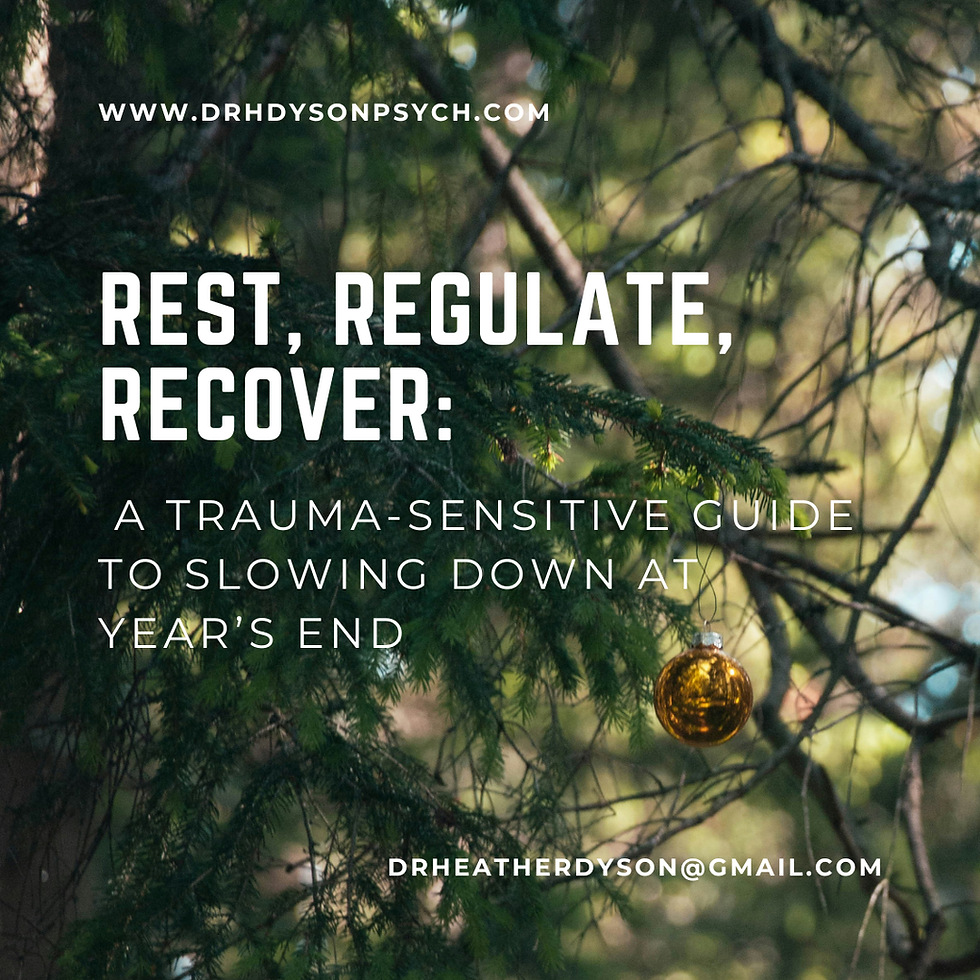Four reasons equine-facilitated psychotherapy might be right for you.
- Dr Heather Dyson

- Oct 3, 2022
- 4 min read

Engaging in any for of therapeutic intervention is always a uniquely personal experience. Perhaps you have found this article because you are considering equine-facilitated psychotherapy (EFPT) already, or you have stumbled across this by accident and want to know some more. In any case, here are four reasons why this form of therapy may be the right one for you.
You have experienced interpersonal trauma.
Interpersonal trauma refers to when a traumatic event involves one, or more, perpetrators, e.g. physical assault or childhood abuse. When interpersonal trauma occurs, it can impact our ability to feel safe in the presence of another. Consequently, sitting in a room with a psychologist, for some people, may feel threatening rather than therapeutic.
For traditional talking therapies to be effective, both therapist and client need to develop a safe environment and share mutually agreed therapeutic goals. This is referred to as developing a therapeutic relationship. For some individuals who have experienced interpersonal trauma, this can be exceptionally challenging and may result in repeated therapeutic ruptures, poor therapeutic experiences for the client, or very slow progress.
Horses offer us a way to develop a safe interpersonal relationship which won’t be experienced as threatening by our nervous system. Consequently, individuals can begin to safely process their experiences in relations to another being without fear of re-traumatisation.
2. You struggle to trust others.
Perhaps you have always struggled to form and maintain relationships with others, or you have experienced a lot of critical and negative interactions with others throughout your life. Consequently, despite their best efforts, therapeutic interventions from a psychologist may be experienced as critical or judgemental. Horses, on the other hand, are able to provide instant bio-feedback to our internal experiences without judgement. They simply respond to our behaviours. They do not care if we cry, shout, shake, or are completely silent. They have no ulterior motive for the relationship and consequently are always authentic.
In other words, a horse will always respond as a horse, without judgement, criticism, or pre-conceptions. Consequently, their “bare minimum” is the foundations for a trusting relationship. When we are provided with the opportunity to experience a trusting relationship, we can then begin to explore how it feels to be safely in relation to another, and what we need to do in order to create and maintain those relationships.
3. You struggle to know what you are feeling.
One of the possible strategies individuals who have experienced trauma develop to protect themselves is to dissociate from their internal physiological and emotional experiences. Subsequently, physiological experiences can be mis-labeled or misunderstood. They can be felt as overwhelming, terrifying, or entirely alien. To make matters worse, society (and social media) have taught us that some emotions are “good” whilst others are “bad”. As a result, many people struggle to sit with more uncomfortable emotions or know how to use these emotions in a positive manner.
Horses do not interpret emotions as being positive or negative, they understand that emotions simply provide us with information about the world. Consequently, horses never feel offended when we are angry, anxious, bored, or depressed. Indeed, horses are the most content when we feel our feelings, otherwise known as being authentic and congruent. They are uniquely designed to pick up on the internal physiological and emotional states of other. As such, they are able to provide us insight into our emotional experiences even when we are unsure ourselves of what they might be.
4. Traditional therapies haven’t been helpful previously.
Traditional talking therapies are extremely effective for the majority of individuals. However, that doesn’t mean that they are effective for all individuals. There are many reasons why individuals struggle to verbalise their distress and consequently, that can make talking therapies challenging from the offset. Perhaps there are no words to describe the physiological sensations you experience in your body. One way that psychologists have attempted to address this, is by developing many different kinds of talking therapies such as EMDR, cognitive behavioural therapy, compassion focused therapy, narrative exposure therapy, cognitive analytical therapy, and trauma-focused CBT.
There are also a wide rage of non-traditional therapies such as Art Therapy, Drama Therapy, Energy Therapy, and Dance Therapy (and equine-facilitated psychotherapy; EFPT!). These therapies are more somatic, working more directly with our physiology and helping our bodies to express the distress that our words simply cannot. There is significant research indicating that our bodies hold on to our trauma and therefore, simply “thinking” about the events is not enough to help our bodies process what happened to them. Consequently, these experiential therapies can be extremely useful for some individuals.
However, how do you know why type of therapy is right for you? Research has shown two facts when it comes to successful outcomes in therapy. Firstly, that you get on with the therapist you are working with. Secondly, that you like the type of therapy that they are providing. These two factors are by far the most important in terms of outcomes. Consequently, if you find a therapist whom you feel that you could form a therapeutic relationship with, and you feel that you would benefit from engaging in equine-facilitated psychotherapy (EFPT), then this is arguably the right therapeutic intervention for you.
If you would like to learn more about EFPT please feel free to email me at drheatherdyson@gmail.com or visit my website www.drhdysonpsych.com.
Photo by Luana Azevedo on Unsplash




Comments